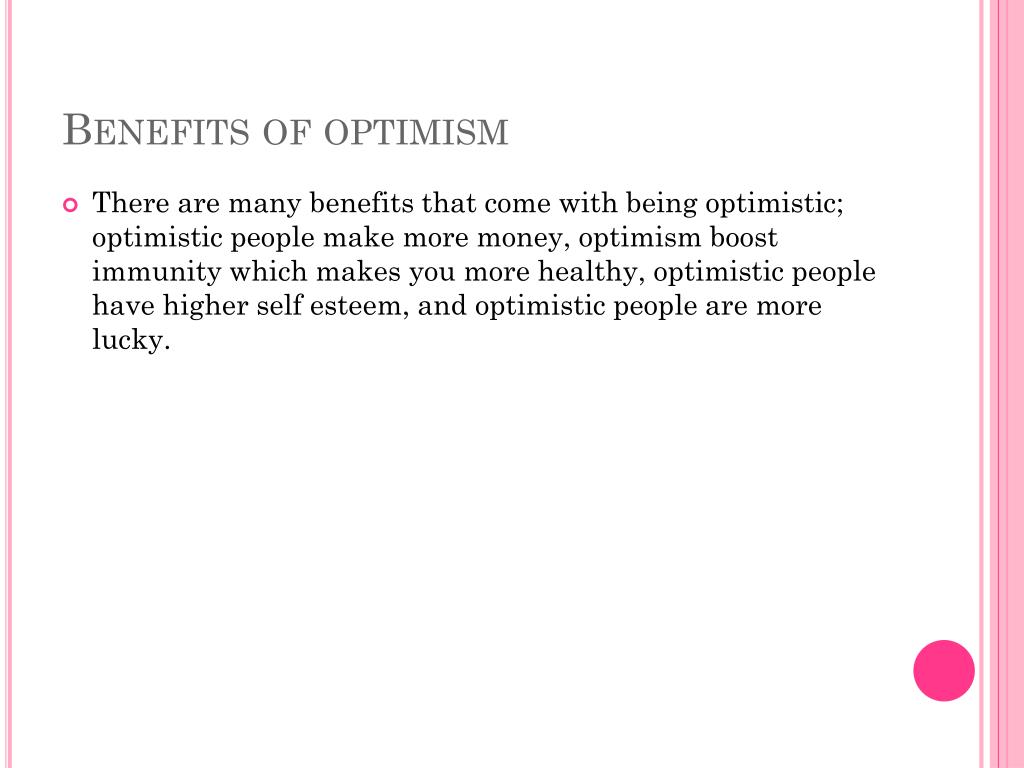
Tallman, B., Shaw, K., Schultz, J., & Altmaier, E. Optimism and physical health: A meta-analytic review. Optimism, social support, and coping strategies as factors contributing to posttraumatic growth: A meta-analysis. Psychological adjustment to chronic disease. Journal of Personality and Social Psychology, 84(4), 813-821.ĭe Ridder, D., Geenen, R., Kuijer, R., & van Middendorp, H. Dispositional pessimism predicts illness-related disruption of social and recreational activities among breast cancer patients. Increasing optimism protects against pain-induced impairment in task-shifting performance. Annals of Behavioral Medicine, 39(1), 4-15.īoselie, J. The value of positive psychology for health psychology: Progress and pitfalls in examining the relation of positive phenomena to health. In essence, this process of taking different perspectives resembles what happens in the posttraumatic growth.Īspinwall, L. This in turn might allow them to think about what they still can do, what resources they have despite limitations, and how they can work toward maximizing the quality of life by achieving some of the goals to an extent. In psychotherapy, it might enhance optimism and positive expectations when clients are asked to describe what it would look like if their problems magically disappeared, and their dreams came true. Using this exercise, researchers at the Maastrict University in the Netherlands have demonstrated that increased optimism mitigated the difficulties in higher-level thinking abilities (e.g., making response decisions on switching tasks) due to experience of pain.

In laboratory settings, researchers induced positive expectancy about the future by asking participants to imagine the Best Possible Self and to write about the future life where everything worked out for the best. So, are gloomy curmudgeons doomed to short, brutish lives, even if they are content to be pessimistic? Some people find eternal optimists insufferable.With this understanding, there may be a room for intervention. "And what this study shows is that optimism actually plays a very big role in our ability to bounce - even if we experience setbacks." "Resilience is our ability to bounce back, to recover," she says. Difficulties don't tend to cause them distress for extended periods of time. And it's not like negative events won't happen."īut the way they cope with problems makes a difference, she says. "They are functioning in our society, meeting demands, prone to burn out. "People who think in optimistic ways are still prone to stress," she says. "Just try it on, try on a different thought, attitude or mindset and play that out and just see what happens," she advises.Īlso, she emphasizes, optimism isn't simply the absence of depression or sadness or stress. "If we can look at that together, we can begin to uncover systems of beliefs and assumptions people are making about themselves in their lives and we can begin to change those."ĭattilo challenges patients to pay attention when a negative outlook kicks in, and consciously shift it. "We examine their thinking under a psychological microscope," Dattilo says, discussing why they anticipate a particular negative outcome. In treatment, Dattilo works to expand their world view, so their set of assumptions about the world and themselves are more uplifting and empowering.


 0 kommentar(er)
0 kommentar(er)
